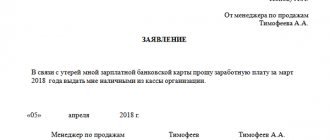Accounting
Alexey Borisov
Leading expert on labor relations
Current as of July 3, 2020
The issuance of money for reporting and control over its spending is accompanied by the preparation of a whole set of documents. What does it include? What risks arise when reporting documents are executed incorrectly and how to reduce them? In our material you will find samples of these documents, and also find out whether the new Directive of the Central Bank of the Russian Federation No. 5348-U has affected the procedure for documenting settlements with accountable persons.
Who is affected by the 2021 changes in cash handling procedures?
According to the provisions of the Bank of Russia Directive No. 5587-U dated October 5, 2020 (hereinafter referred to as the Directive), the new 2020 cash handling rules apply to legal entities and individual entrepreneurs, including entities related to small and medium-sized businesses (SMEs).
Thus, almost everyone .
However, the points of the new rules themselves are still divided into those that everyone , and those that only organizations must comply with.
Results
The procedure for accounting for settlements with accountants is very important.
This section is reflected in the balance sheet items. Even small errors in working with accountable persons can affect the results of annual reporting. Therefore, it is so important to check the correctness of filling out documents and the timeliness of their reflection in the accounting accounts. You can find more complete information on the topic in ConsultantPlus. Free trial access to the system for 2 days.
The cashier is required to check the solvency of the money
New rules effective November 30, 2020 clarify the work procedure and responsibilities of a cashier (or a person performing similar functions).
When accepting cash payments, the cashier is obliged to :
1. Perform sheet and piece counting of accepted bills and coins.
2. Monitor the solvency of accepted cash - in accordance with the instructions of the Bank of Russia No. 1778-U.
Read more about counterfeit money in our article “How to distinguish counterfeit money from real money.”
3. Accept cash means of payment if they meet the criteria of solvency established by the Bank of Russia, if it is a cashier of a legal entity and/or a paying agent.
When issuing cash from the cash register, it is the cashier’s responsibility to make sure that the issuance occurs according to one of the established documents:
- expense cash order 0310002;
- payroll 0301009;
- payroll 0301011.
In addition, when issuing cash, the cashier must be guided by another instruction of the Central Bank: only bills and coins that do not contain damage , as stated in the instruction of the Bank of Russia dated January 29, 2018 No. 630-P.
Let's remind them. It is impossible to issue cash from the cash desk from November 30, 2020 if one banknote has one or more of the following damages:
Coins cannot mechanical, thermal or chemical .
is obliged to accept money from the buyer , but has no right . Such cash can only be dealt with in the manner recommended in instruction No. 630-P - hand it over to the bank.
Tax risks of documentary reporting errors
If there are errors in the documents of accountable persons or supporting documents are not attached to the advance report, various types of risks may arise, including tax ones:
| Type of violation in reporting documents | Emerging risks |
| Documents confirming expenses are not attached to the advance report |
In “profitable” expenses, it is permissible to take into account accountable expenses if the supporting documents are drawn up in accordance with the legislation of the Russian Federation, and from them it is possible to establish what expenses were incurred (clause 1 of Article 252 of the Tax Code of the Russian Federation, letters of the Ministry of Finance dated January 28, 2020 No. 03-03- 06/3/4915, dated 01/28/2020 No. 03-03-06/1/4913, dated 03/21/2019 No. 03-03-06/1/19017, dated 03/20/2019 No. 03-03-06/1/18478 )
In the absence of documentary evidence of expenses, employees may receive income in kind (Article 211 of the Tax Code of the Russian Federation). Such amounts are not exempt from personal income tax (Letter of the Ministry of Finance dated May 14, 2018 No. 03-03-06/1/31933) |
| Accountable funds were issued without filing applications. Material assets purchased with money issued on account are not related to the company’s activities and are not registered | Fine 40,000 rubles. (Part 1 of Article 15.1 of the Code of Administrative Offenses of the Russian Federation) for violation of Art. 2 and 5 of the Law of May 22, 2003 No. 54-FZ “On the use of cash register equipment...” (Resolution of the Ninth Arbitration Court of Appeal dated October 3, 2017 No. A40-62347/2017) |
| Payment of part of wages under the guise of travel expenses | Additional accrual of insurance premiums on amounts paid (Resolution of the Fifteenth Arbitration Court of Appeal dated December 14, 2017 No. A32-36856/2016) |
| The advance report was not submitted on time, accountable funds were not withheld from the salary of the accountable person | Funds issued for reporting, for which the employee did not report within the established time frame, are recognized as his debt to the employer and are subject to deduction from wages (Article 137 of the Labor Code of the Russian Federation). If deduction is not made, insurance premiums must be charged for the amount of the unreturned report, as for payments in within the framework of labor relations (Articles 420, 421 of the Tax Code of the Russian Federation, Letter of the Ministry of Finance dated 01.02.2018 No. 03-04-06/5808, Letter of the Ministry of Labor dated 12.12.2014 N 17-3 / B-609) |
In addition to tax risks, other negative consequences are possible. For example, if inventory items purchased with accountable money without supporting documents are not capitalized, a claim may be brought against the accountable person for causing damage to the company (Resolution of the Administrative District of the North Caucasus District dated October 5, 2017 No. A32-12049/2015).
New rules for issuing money on account from November 30, 2021
From November 30, 2020, several cash issuances to one or more accountable persons are allowed under one administrative document. And for several accountants you can draw up one common document.
In addition, from November 30, 2020, a legal entity has the right to set its own deadline during which the accountant must submit an advance report. Let us note that previously it was recorded in the cash register that the employee submits the advance report within a period not exceeding 3 working days:
- or after the expiration date for which the money was issued;
- or from the day you return to work (for example, after a business trip).
Let us remind you that establishing your own procedure for issuing cash (like other similar rules) must first be reflected in the local regulations of the legal entity and only then be applied in practice.
Please also note that the new rules under Directive No. 5587-U do not contain provisions providing for the issuance of cash against reporting by proxy .
How and why settlements with accountable persons are reflected in the balance sheet
The work of accountants is an integral part of the financial and economic life of the organization and is reflected in many accounting accounts and, therefore, reflected in balance sheet items.
There is a balance in every economically independent organization. It summarizes the monetary indicators of the state of funds and the sources from which the funds came from as of the reporting date. As a rule, before drawing up a balance sheet, the accountant conducts an inventory of the assets and all financial liabilities of the organization. This includes an inventory of settlements with accountants.
You can read more about it in our article “Inventory of settlements with accountable persons (nuances).”
Based on the inventory results, the accountant looks at the ending balance of the account. 71 and makes an entry in the balance sheet:
- if the balance is debit, then this debt is included in the total accounts receivable and is taken into account in the asset item of the balance sheet (II “Current assets”, line code - 1230);
- if the balance is credit, then this debt is included in the total accounts payable and is taken into account in the liability item of the balance sheet (V “Short-term liabilities”, line code - 1520).
Read more about drawing up a balance sheet in the article “Procedure for drawing up a balance sheet (example)”.
Who may not keep a cash book?
If a separate division of an organization does not keep cash, but receives it only for certain purposes and, upon completion of operations, hands over the balance to the legal entity’s cash register, then such a separate division may not maintain .
In this case, cash deposited by a separate division is accepted into the cash register of a legal entity using cash receipt order 0310001.
Similarly, according to the established cash register form, it is necessary to accept cash withdrawn from the automatic device into the cash register. The new rules specifically stipulate that enterprises and individual entrepreneurs can conduct cash transactions using automatic devices that operate automatically without the participation of employees.
What changes need to be taken into account in 2019
Legislative reform of accounting provisions regarding the issuance of funds for reporting in budgetary institutions began in 2021. According to the order of the Ministry of Finance dated July 1, 2013 No. 65n, a number of amendments were made to the instructions on budget classification, changing some codes for the classification of operations of the general government sector (KOSGU). Thus, analytical accounts have been updated in the budget accounting registers, reflecting the movement of accountable amounts. At the same time, amendments were included in the Tax Code of the Russian Federation.
In 2021, the Central Bank made changes to the report by adopting regulatory legal act No. 4416-U dated June 19, 2017, which introduced significant amendments to the instructions of the Central Bank of the Russian Federation dated March 11, 2014 No. 3210-U. The main modifications concerned paragraph 6.3.
New reporting rules:
- only an employee with whom the employer has signed an employment contract (Article 15 of the Labor Code of the Russian Federation), as well as individuals working under a civil law contract (letter of the Central Bank of the Russian Federation dated October 2, 2014 No. 29-R-R-6/7859) can receive reporting money );
- Employees do not have to provide an application to issue money. The basis for payment of the advance amount is an order, instruction or decision signed by the manager;
- the issuance of the required amounts can be carried out even if there is a debt on accountable money issued earlier.
Thus, from August 19, it has become easier to issue accountable amounts.
What to do if the online receipt is incorrect?
In our practice, there was a case when a client brought an incorrect check from a business trip employee - without a QR code. In this case, accepting the check is dangerous. You can write off expenses only if the remaining papers contain all the necessary details and there are no other shortcomings - this is evidenced by the ruling of the RF Armed Forces No. 302-KG16-450 dated March 9, 2016.
Do you suspect that the employee printed or bought the check himself? Don't waste time on examination. Do not record expenses in accounting and require the employee to bring the remaining papers or return the accountable funds.
A similar situation occurs when there is no TIN on the check.
Main rules
Let's summarize the above:
- Any amount can be issued against the report.
- From August 19, 2017, in order to receive money on account, an employee only needs an order from the head of the company. You don't have to write a statement.
- Also, regarding accountable persons, the 2021 changes say that from August 19, 2017, they can receive cash on account, even if they have not repaid the debt on the previous advance.
- Accountable amounts can be transferred to bank cards.
- From August 19, 2021, it is necessary to update local acts on settlements with accountable persons.
What to do if an employee brings a slip without a receipt?
Let's assume you transferred accountable funds to an employee's card. When paying for a product or service, the employee received a sales receipt and a slip from the terminal. There is no cash receipt - as a rule, it remains with the cashier if he used the online cash register.
Explain to the employee in advance that he asks the seller to give a paper check or send an electronic version by e-mail. If the “train has left”, take into account the costs based on the slip and sales receipt, but be prepared to prove the costs to the Federal Tax Service inspector.
What has changed the law on the use of CCP
In connection with changes in Federal Law No. 54-FZ dated May 22, 2003, questions began to arise related to the interpretation of the term “extradition”. In Art. 1.1 of Law No. 54-FZ, settlements are defined as the acceptance (receipt) and payment of funds. And many began to wonder whether it is necessary to use cash register systems when issuing accountable amounts.
Explanations on this issue are provided by the Letter of the Federal Tax Service dated August 10, 2021 No. AS-4-20/ [email protected] : if payments are made under a GPC agreement and upon issuance of accountable funds, then there is no need to punch a cash receipt.
The same letter put an end to another issue. If a company gave an employee money but did not clear the check, how should the employee purchase inventory items as part of settlements with accountable persons? How should he spend the money? Let's say he went to the store and purchased printer cartridges at our request. At the same time, he paid in cash, which was given to him on account.
Clause 2 of the Federal Tax Service Letter No. AS-4-20/ [email protected] states that if an employee makes a cash payment in favor of a supplier for inventory items, the seller is obliged to issue him a cash receipt. And even if an employee has a power of attorney (as a representative of a legal entity), this does not change anything. Letter from the Federal Tax Service for Moscow dated June 14, 2018 No. 17-26/2/ [email protected] clearly indicates that there is no need to issue a counter check.
Thus, when making cash payments as part of settlements with accountable persons, the check is issued by the seller-supplier of inventory items or services. The accountant does not punch a counter check, so a fiscal check is not generated in such a situation, and information is not transmitted to the Federal Tax Service.
However, as before, all payments to accountable persons, if carried out, are supported by the documents that record the fact of payment. That is why the relevant documents are attached to the expense report.
Checking advance reports of accountable persons
In order to report for funds received and spent, the accountant needs to draw up an advance report and attach to it documents that will serve as the basis for accepting the expenses incurred - checks, BSO, invoices, travel tickets, slips (for payments by bank card), etc. .
If the advance was issued by transfer to the employee’s salary or accountable card, then the payment order must indicate that the money transferred is accountable. To receive accountable amounts on a bank card, the employee is recommended to write an application requesting the issuance of money for a certain time and indicating the card details - this is stated in the letter of the Ministry of Finance dated August 25, 2014 No. 03-11-11/42288. In the same letter, officials report that it is advisable to develop and consolidate the procedure for issuing an advance for household needs by non-cash means and drawing up an advance report and establishing it in the accounting policy of the enterprise.
The form for the advance report can be form AO-1, approved by the State Statistics Committee of Russia dated August 1, 2001 No. 55. It is not mandatory, therefore it is allowed to develop your own report form for the advance received, taking into account the specifics of the enterprise and compliance with all the requirements for filling out the necessary details in accordance with paragraph. 2 of the Law “On Accounting” dated December 6, 2011 No. 402-FZ.
The report form must have space reserved for completion by the employee and the accountant. The document has a front and back side. First, the employee fills out the part intended for him on the front side, in which he indicates information about himself and the purpose of the advance received. Then, on the reverse side, he lists all supporting documents indicating their names, numbers, dates, amounts (for each separately). The total is calculated and indicated. Documents are attached to the report. For ease of use, they can be numbered in accordance with the serial number assigned in the expense report.
The employee passes the completed form with attached originals about expenses to the accountant, who checks the received document:
- according to the form - the correctness of filling out all the necessary lines, the presence of the specified documents, the usefulness of their execution, the correct transfer of data from the originals to the report, the correspondence of the amounts, the presence of signatures;
- in terms of content - the intended purpose of the expenses incurred, the reliability of the documents, the correspondence of the specified dates to the time for which the advance was issued;
- by arithmetic calculation - the total amount in the report is checked, which must be repaid in this sub-report.
After receiving the advance report from the accountant, the accountant must give him a receipt stating that he accepted the report with the attached documents for verification.
The report, verified and signed by the accountant and chief accountant, is submitted to the manager or authorized person for approval. By signing, the director agrees to consider the costs incurred to be justified.
The deadline for submitting the advance report to the accounting department for verification and approval of the report for the advance for the needs of business activities is established by the manager at his discretion. It is recommended to consolidate them in the accounting policies. Based on the approved report in the accounting department, accountable amounts are written off in accordance with the procedure established by law.







